Unit 2 What time do you go to school Period 5 Section B (3a-Self Check)课件(共24张PPT)
文档属性
| 名称 | Unit 2 What time do you go to school Period 5 Section B (3a-Self Check)课件(共24张PPT) | 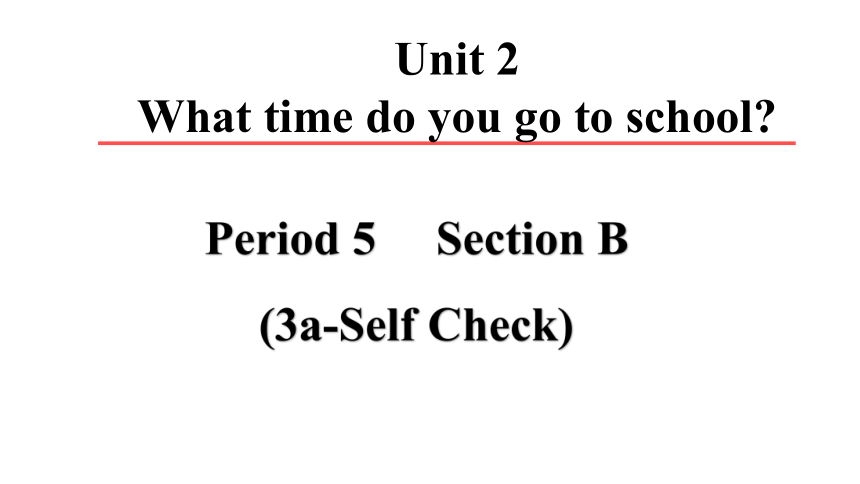 | |
| 格式 | pptx | ||
| 文件大小 | 12.4MB | ||
| 资源类型 | 教案 | ||
| 版本资源 | 人教新目标(Go for it)版 | ||
| 科目 | 英语 | ||
| 更新时间 | 2023-12-17 19:56:02 | ||
图片预览

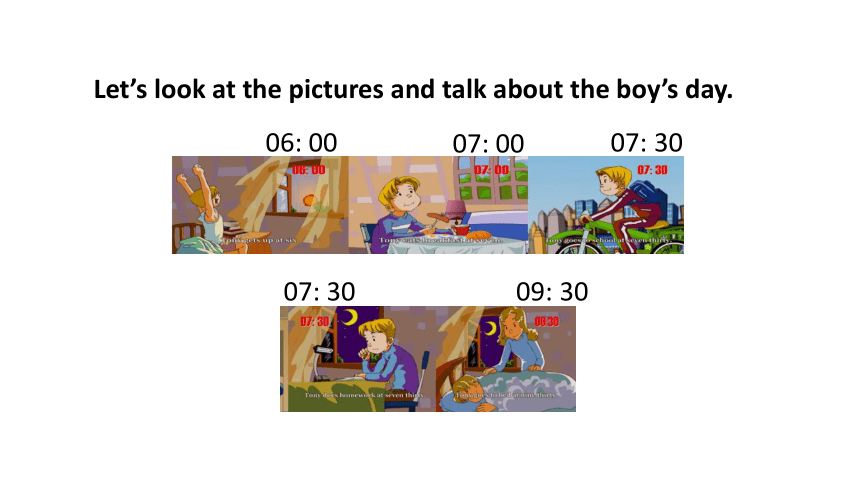
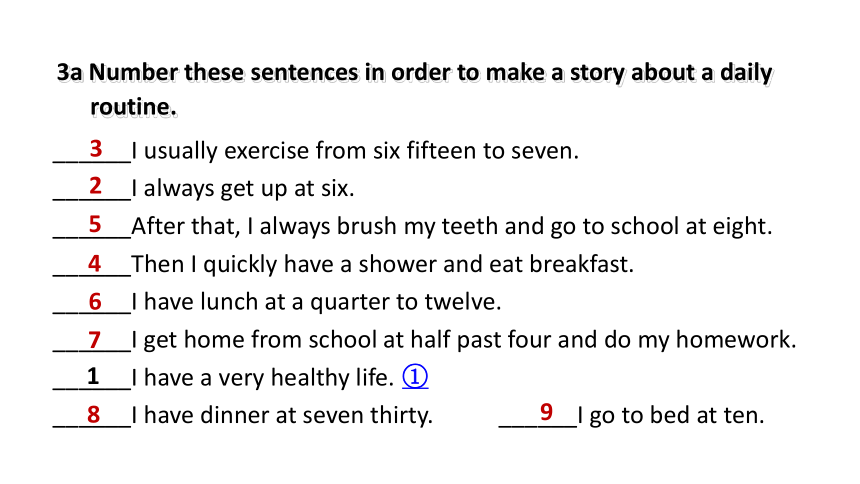
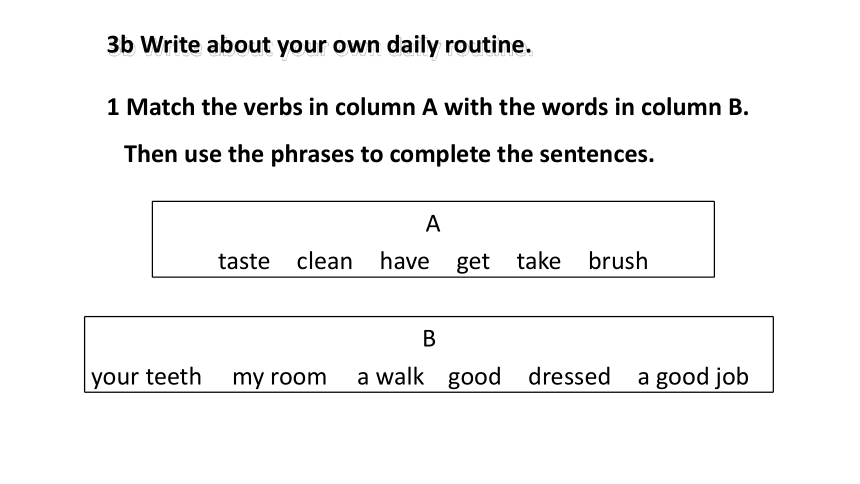
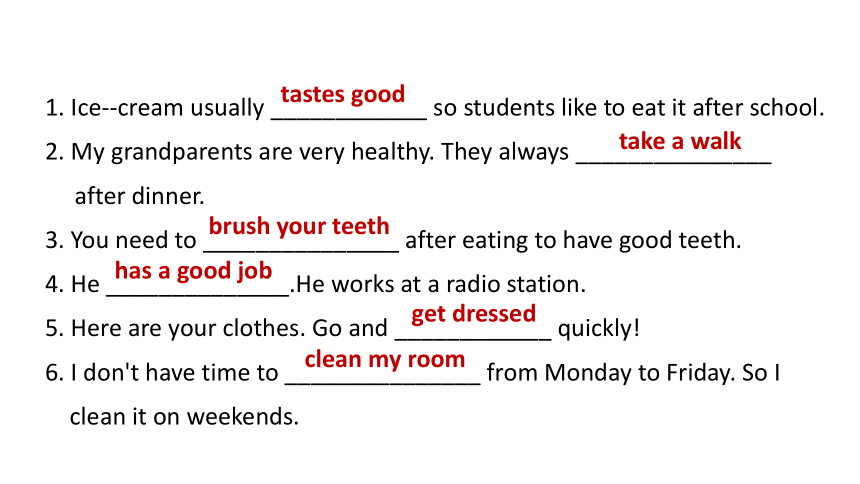
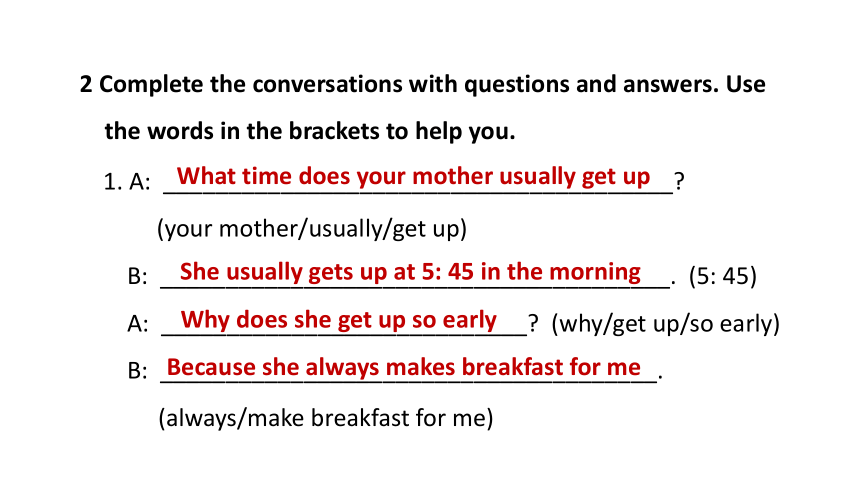
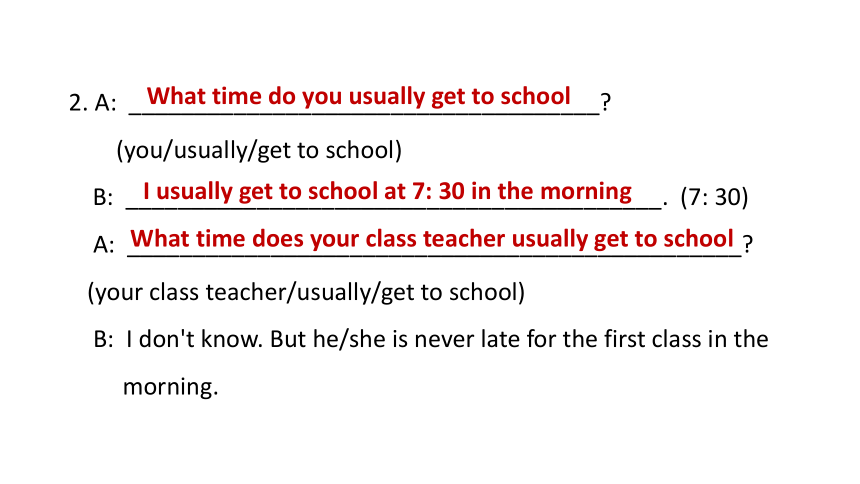
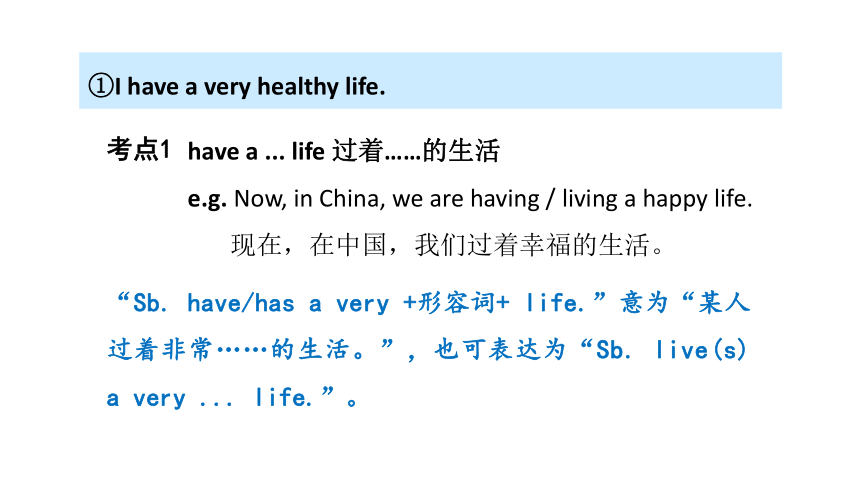
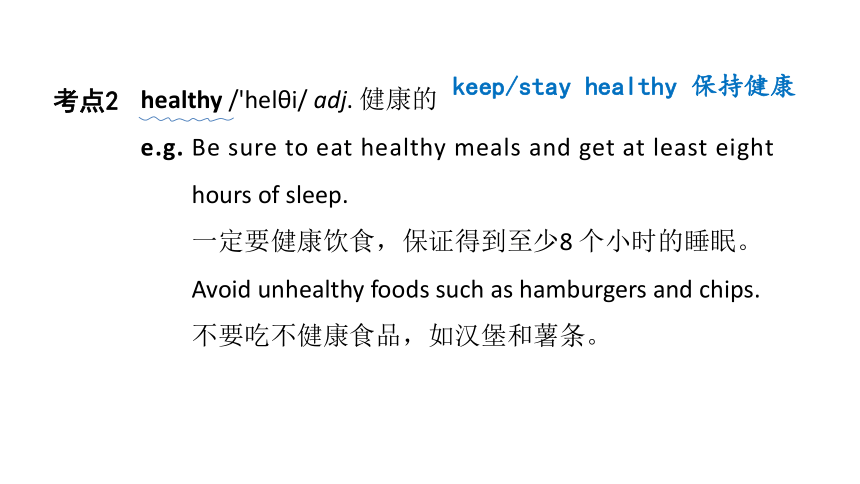
文档简介
(共24张PPT)
Period 5 Section B (3a-Self Check)
Unit 2
What time do you go to school
Let’s look at the pictures and talk about the boy’s day.
06: 00
07: 00
07: 30
07: 30
09: 30
3a Number these sentences in order to make a story about a daily routine.
______I usually exercise from six fifteen to seven.
______I always get up at six.
______After that, I always brush my teeth and go to school at eight.
______Then I quickly have a shower and eat breakfast.
______I have lunch at a quarter to twelve.
______I get home from school at half past four and do my homework.
______I have a very healthy life. ①
______I have dinner at seven thirty. ______I go to bed at ten.
1
3
2
5
4
6
7
8
9
1 Match the verbs in column A with the words in column B. Then use the phrases to complete the sentences.
A
taste clean have get take brush
B
your teeth my room a walk good dressed a good job
3b Write about your own daily routine.
1. Ice- cream usually ____________ so students like to eat it after school.
2. My grandparents are very healthy. They always _______________
after dinner.
3. You need to _______________ after eating to have good teeth.
4. He ______________.He works at a radio station.
5. Here are your clothes. Go and ____________ quickly!
6. I don't have time to _______________ from Monday to Friday. So I clean it on weekends.
tastes good
take a walk
brush your teeth
has a good job
get dressed
clean my room
2 Complete the conversations with questions and answers. Use the words in the brackets to help you.
1. A: _______________________________________
(your mother/usually/get up)
B: _______________________________________. (5: 45)
A: ____________________________ (why/get up/so early)
B: ______________________________________.
(always/make breakfast for me)
What time does your mother usually get up
She usually gets up at 5: 45 in the morning
Why does she get up so early
Because she always makes breakfast for me
2. A: ____________________________________
(you/usually/get to school)
B: _________________________________________. (7: 30)
A: _______________________________________________
(your class teacher/usually/get to school)
B: I don't know. But he/she is never late for the first class in the
morning.
What time do you usually get to school
I usually get to school at 7: 30 in the morning
What time does your class teacher usually get to school
①I have a very healthy life.
have a ... life 过着……的生活
e.g. Now, in China, we are having / living a happy life.
现在,在中国,我们过着幸福的生活。
考点1
“Sb. have/has a very +形容词+ life.”意为“某人过着非常……的生活。”,也可表达为“Sb. live(s) a very ... life.”。
healthy /'helθi/ adj. 健康的
e.g. Be sure to eat healthy meals and get at least eight hours of sleep.
一定要健康饮食,保证得到至少8 个小时的睡眠。
Avoid unhealthy foods such as hamburgers and chips.
不要吃不健康食品,如汉堡和薯条。
考点2
keep/stay healthy 保持健康
His grandparents are in good health.
他的祖父母健康状况良好。
This knowledge can help people eat more healthily.
这一知识可以帮助人们吃得更健康。
be in good/poor health
健康状况良好/不好
healthy 的词形变化:
unhealthy adj. 不健康的
health n. 健康
healthily adv. 健康地
考题: [十堰] 多吃蔬菜和水果有助于人们保持健康。
Eating more vegetables and fruits helps people _______________________.
(to) keep/stay healthy
life /la f/ n. 生活;生命
考点3
life “(某种方式的) 生活”, 既可用作可数名词也可用作不可数名词。 He has a busy life every day.
他每天过着忙碌的生活。
“性命;人命”, 既可用作可数名词也可用作不可数名词。 He saved many lives in the
earthquake. 他在那次地震中救了很多人的命。
“一生, 终身”, 既可用作可数名词也可用作不可数名词。 The writer writes lots of books in her life. 这位作家在她的一生中写了许多书。
拓展: life 的复数形式为 lives, 类似的名词变复数还有:
wife → wives, half → halves, leaf → leaves, shelf → shelves,
thief → thieves, knife → knives, wolf → wolves。
life 的相关短语:in daily life 在日常生活中
in one’s life 在某人的一生中
save one’s life 救某人的命
come to life 变得活跃 lose one’s life 丧生
返回
假设你的朋友叫Joe, 下面是他的作息时间表, 你觉得他的生活健康吗?根据表格内容, 写一篇不少于60 词的短文介绍他的生活习惯, 可以适当发挥。
单元话题
Activities(活动) Time
In the morning get up 6: 40
take a shower 7: 00
eat breakfast 7: 30
go to school 8: 10
In the afternoon eat rice and chicken 12: 00
play basketball from 5: 00 to 5: 30
In the evening do homework 7: 00
watch TV from 8: 00 to 9: 00
go to bed 9: 30
我的观点: I think he... 审题指导
1. 注意时间的先后顺序;
2. 正确运用人称。介绍他人的活动,用第三人称,在时态为一般现在时的句子中,动词要用第三人称单数形式;
3. 要掌握好时间的各种表达方式,恰当运用介词和其他关联词。
写作方法
“三步三要素法”写日常作息习惯
第一步:开篇点题,点明人物(who);
第二步:具体描述人物(who)在什么时间(when)做了什么(what);
第三步:总结全文,阐述观点。
写作模板
『三步三要素法』写日常作息习惯 开篇点题 Joe is ... He has his living habits. 具体描述 上午 活动 In the morning, he usually ... at ...
Then ... After that ...
下午 活动 At twelve thirty he ...
After school, he usually ... for ...
晚上 活动 In the evening, he always ...
Then he ... At ..., he ...
总结全文 阐述观点 I think he has healthy habits. 经典词句
单词 at, usually, often, always, never, sometimes, exercise
短语 get up, take a shower, go to school, have breakfast, do one’s homework, go to bed, play basketball, from ... to ...
句子 ① In the morning, he usually gets up at six forty.
② Then he takes a shower at seven and has breakfast at seven thirty.
③ After that, he goes to school at ten past eight.
④ At twelve thirty, he eats rice and chicken for lunch.
句子 ⑤ After school, he usually plays basketball for half an hour.
⑥ In the evening, he always does his homework at seven.
⑦ Then he sometimes watches TV from eight to nine.
⑧ At nine thirty, he goes to bed.
⑨ I think he has healthy habits.
范文赏析
Joe is my friend. He has his living habits.
In the morning, he usually ① gets up at six forty. Then ② he takes a shower at seven and eats breakfast at seven thirty. After that ② , he goes to school at ten past eight. At twelve o’ clock, he eats rice and chicken for lunch. After school② , he usually ① plays basketball for half an hour. In the evening, he always ① does his homework at seven. Then ② he sometimes ① watches TV from eight to nine. At nine thirty, he goes to bed.
I think③ he has healthy habits.
名师点评
本文运用了“三步三要素法”写日常作息习惯。结构严谨,语言流畅,信息全面,时间顺序性强,叙述有条理。
第一段: 点明了人物 “who”,人称代词he 使用正确。
第二段: 明确了时间“when”,正确使用了介词(in + 早上/ 晚上;at + 时间点)。介绍了具体的活动“what”,由get up, take a shower 到go to bed。
第三段: 总结全文,阐述观点。
添彩点:① 恰当运用了相应的频度副词,表明做某事的频率。②巧妙地运用了then, after that, after school 等叙述日常活动的顺序。③ 结尾用I think ... 表明了自己对Joe 日常生活习惯的看法。
本节课主要学习掌握了如何写有关日常生活的作文, 掌握了知识点I have a … life. 的用法, 做了Self Check部分的练习题, 巩固了所学知识。
Period 5 Section B (3a-Self Check)
Unit 2
What time do you go to school
Let’s look at the pictures and talk about the boy’s day.
06: 00
07: 00
07: 30
07: 30
09: 30
3a Number these sentences in order to make a story about a daily routine.
______I usually exercise from six fifteen to seven.
______I always get up at six.
______After that, I always brush my teeth and go to school at eight.
______Then I quickly have a shower and eat breakfast.
______I have lunch at a quarter to twelve.
______I get home from school at half past four and do my homework.
______I have a very healthy life. ①
______I have dinner at seven thirty. ______I go to bed at ten.
1
3
2
5
4
6
7
8
9
1 Match the verbs in column A with the words in column B. Then use the phrases to complete the sentences.
A
taste clean have get take brush
B
your teeth my room a walk good dressed a good job
3b Write about your own daily routine.
1. Ice- cream usually ____________ so students like to eat it after school.
2. My grandparents are very healthy. They always _______________
after dinner.
3. You need to _______________ after eating to have good teeth.
4. He ______________.He works at a radio station.
5. Here are your clothes. Go and ____________ quickly!
6. I don't have time to _______________ from Monday to Friday. So I clean it on weekends.
tastes good
take a walk
brush your teeth
has a good job
get dressed
clean my room
2 Complete the conversations with questions and answers. Use the words in the brackets to help you.
1. A: _______________________________________
(your mother/usually/get up)
B: _______________________________________. (5: 45)
A: ____________________________ (why/get up/so early)
B: ______________________________________.
(always/make breakfast for me)
What time does your mother usually get up
She usually gets up at 5: 45 in the morning
Why does she get up so early
Because she always makes breakfast for me
2. A: ____________________________________
(you/usually/get to school)
B: _________________________________________. (7: 30)
A: _______________________________________________
(your class teacher/usually/get to school)
B: I don't know. But he/she is never late for the first class in the
morning.
What time do you usually get to school
I usually get to school at 7: 30 in the morning
What time does your class teacher usually get to school
①I have a very healthy life.
have a ... life 过着……的生活
e.g. Now, in China, we are having / living a happy life.
现在,在中国,我们过着幸福的生活。
考点1
“Sb. have/has a very +形容词+ life.”意为“某人过着非常……的生活。”,也可表达为“Sb. live(s) a very ... life.”。
healthy /'helθi/ adj. 健康的
e.g. Be sure to eat healthy meals and get at least eight hours of sleep.
一定要健康饮食,保证得到至少8 个小时的睡眠。
Avoid unhealthy foods such as hamburgers and chips.
不要吃不健康食品,如汉堡和薯条。
考点2
keep/stay healthy 保持健康
His grandparents are in good health.
他的祖父母健康状况良好。
This knowledge can help people eat more healthily.
这一知识可以帮助人们吃得更健康。
be in good/poor health
健康状况良好/不好
healthy 的词形变化:
unhealthy adj. 不健康的
health n. 健康
healthily adv. 健康地
考题: [十堰] 多吃蔬菜和水果有助于人们保持健康。
Eating more vegetables and fruits helps people _______________________.
(to) keep/stay healthy
life /la f/ n. 生活;生命
考点3
life “(某种方式的) 生活”, 既可用作可数名词也可用作不可数名词。 He has a busy life every day.
他每天过着忙碌的生活。
“性命;人命”, 既可用作可数名词也可用作不可数名词。 He saved many lives in the
earthquake. 他在那次地震中救了很多人的命。
“一生, 终身”, 既可用作可数名词也可用作不可数名词。 The writer writes lots of books in her life. 这位作家在她的一生中写了许多书。
拓展: life 的复数形式为 lives, 类似的名词变复数还有:
wife → wives, half → halves, leaf → leaves, shelf → shelves,
thief → thieves, knife → knives, wolf → wolves。
life 的相关短语:in daily life 在日常生活中
in one’s life 在某人的一生中
save one’s life 救某人的命
come to life 变得活跃 lose one’s life 丧生
返回
假设你的朋友叫Joe, 下面是他的作息时间表, 你觉得他的生活健康吗?根据表格内容, 写一篇不少于60 词的短文介绍他的生活习惯, 可以适当发挥。
单元话题
Activities(活动) Time
In the morning get up 6: 40
take a shower 7: 00
eat breakfast 7: 30
go to school 8: 10
In the afternoon eat rice and chicken 12: 00
play basketball from 5: 00 to 5: 30
In the evening do homework 7: 00
watch TV from 8: 00 to 9: 00
go to bed 9: 30
我的观点: I think he... 审题指导
1. 注意时间的先后顺序;
2. 正确运用人称。介绍他人的活动,用第三人称,在时态为一般现在时的句子中,动词要用第三人称单数形式;
3. 要掌握好时间的各种表达方式,恰当运用介词和其他关联词。
写作方法
“三步三要素法”写日常作息习惯
第一步:开篇点题,点明人物(who);
第二步:具体描述人物(who)在什么时间(when)做了什么(what);
第三步:总结全文,阐述观点。
写作模板
『三步三要素法』写日常作息习惯 开篇点题 Joe is ... He has his living habits. 具体描述 上午 活动 In the morning, he usually ... at ...
Then ... After that ...
下午 活动 At twelve thirty he ...
After school, he usually ... for ...
晚上 活动 In the evening, he always ...
Then he ... At ..., he ...
总结全文 阐述观点 I think he has healthy habits. 经典词句
单词 at, usually, often, always, never, sometimes, exercise
短语 get up, take a shower, go to school, have breakfast, do one’s homework, go to bed, play basketball, from ... to ...
句子 ① In the morning, he usually gets up at six forty.
② Then he takes a shower at seven and has breakfast at seven thirty.
③ After that, he goes to school at ten past eight.
④ At twelve thirty, he eats rice and chicken for lunch.
句子 ⑤ After school, he usually plays basketball for half an hour.
⑥ In the evening, he always does his homework at seven.
⑦ Then he sometimes watches TV from eight to nine.
⑧ At nine thirty, he goes to bed.
⑨ I think he has healthy habits.
范文赏析
Joe is my friend. He has his living habits.
In the morning, he usually ① gets up at six forty. Then ② he takes a shower at seven and eats breakfast at seven thirty. After that ② , he goes to school at ten past eight. At twelve o’ clock, he eats rice and chicken for lunch. After school② , he usually ① plays basketball for half an hour. In the evening, he always ① does his homework at seven. Then ② he sometimes ① watches TV from eight to nine. At nine thirty, he goes to bed.
I think③ he has healthy habits.
名师点评
本文运用了“三步三要素法”写日常作息习惯。结构严谨,语言流畅,信息全面,时间顺序性强,叙述有条理。
第一段: 点明了人物 “who”,人称代词he 使用正确。
第二段: 明确了时间“when”,正确使用了介词(in + 早上/ 晚上;at + 时间点)。介绍了具体的活动“what”,由get up, take a shower 到go to bed。
第三段: 总结全文,阐述观点。
添彩点:① 恰当运用了相应的频度副词,表明做某事的频率。②巧妙地运用了then, after that, after school 等叙述日常活动的顺序。③ 结尾用I think ... 表明了自己对Joe 日常生活习惯的看法。
本节课主要学习掌握了如何写有关日常生活的作文, 掌握了知识点I have a … life. 的用法, 做了Self Check部分的练习题, 巩固了所学知识。
同课章节目录
- Unit 1 Can you play the guitar?
- Section A
- Section B
- Unit 2 What time do you go to school?
- Section A
- Section B
- Unit 3 How do you get to school?
- Section A
- Section B
- Unit 4 Don't eat in class.
- Section A
- Section B
- Unit 5 Why do you like pandas?
- Section A
- Section B
- Unit 6 I'm watching TV.
- Section A
- Section B
- Review of Units 1-6
- Unit 7 It's raining!
- Section A
- Section B
- Unit 8 Is there a post office near here?
- Section A
- Section B
- Unit 9 What does he look like?
- Section A
- Section B
- Unit 10 I'd like some noodles.
- Section A
- Section B
- Unit 11 How was your school trip?
- Section A
- Section B
- Unit 12 What did you do last weekend?
- Section A
- Section B
